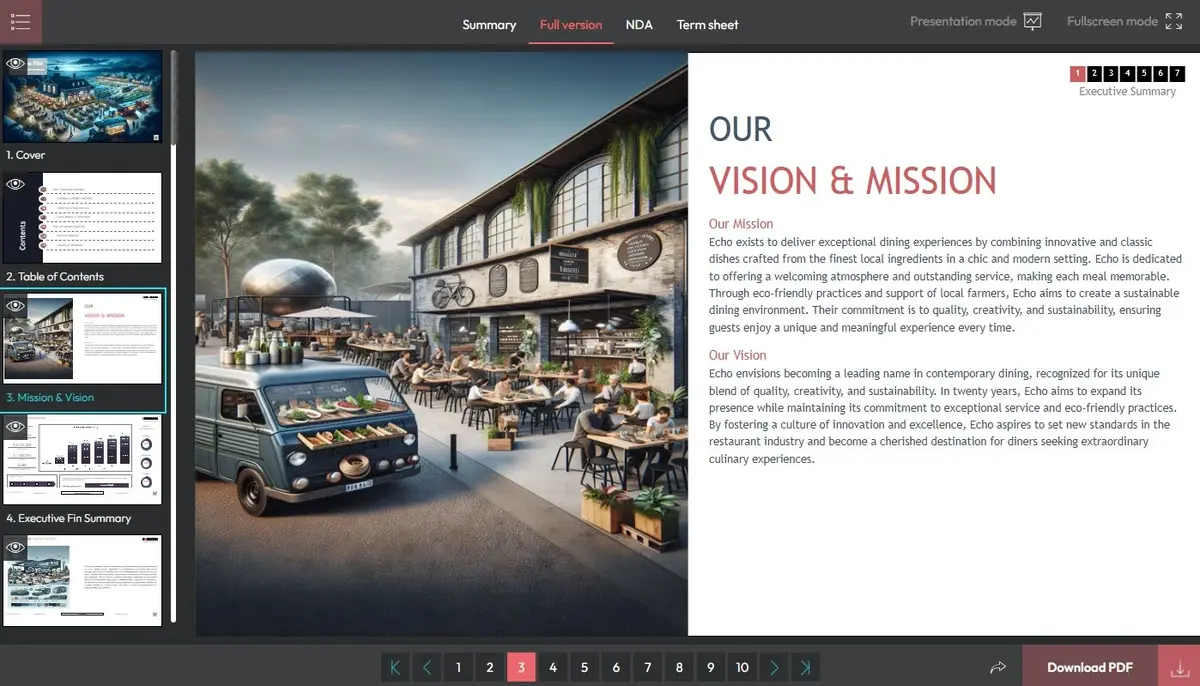)
Starting a restaurant requires a well-thought-out plan. A clear business plan helps you organize your ideas, set goals, and understand your budget. It’s also essential for attracting investors, who want to see a solid plan before committing support.
Using a restaurant business plan template will guide you through each step, from defining your concept to planning finances. We’ve also included a sample restaurant business plan template as a real-world example, making it easier to understand what works. This guide will help you build a strong foundation for your restaurant’s success.
Why You Need a Restaurant Business Plan
A well-crafted business plan is a vital tool for any new restaurant. Here’s why it matters:
Attract Investors and Secure Funding: Investors want to see a clear plan. A business plan shows them you’ve thought through your concept and understand what it takes to succeed.
Define Your Concept and Market Position: A business plan helps you clarify your restaurant’s unique concept and target market. This focus makes it easier to stand out in a competitive industry.
Set Realistic Goals for Growth: With a business plan, you can outline clear financial and operational goals. Setting milestones for growth keeps you on track and helps measure progress over time.
In fact, research shows that businesses with a plan are twice as likely to grow. For new restaurants, planning is especially important to avoid common pitfalls, manage costs, and meet early revenue targets. A strong business plan guides your restaurant from the start and keeps you focused on long-term success.
How to Write a Restaurant Business Plan
Here’s a quick guide on how to use a restaurant business plan template to cover everything you need:
Executive Summary
Start with a short executive summary of your restaurant’s concept, mission, and goals. Think of it as the “big picture” that tells readers what your restaurant is all about.
Restaurant Concept and Branding
Describe your restaurant’s concept in detail. Are you opening a family diner or a fine-dining spot? Explain your theme, menu style, and the vibe you want to create.
Market Analysis
Show you know your audience and competition. Research your target customers, and explain how your restaurant will stand out in the market.
Menu and Services
Outline your menu and any special services, like delivery or catering. Highlight a few key dishes to give readers a feel for your restaurant’s food style.
Operations Plan
Cover the day-to-day details here. This includes your location, business hours, and staff structure. Also, outline how you’ll handle suppliers and inventory.
Marketing and Sales Strategy
Explain how you’ll attract customers. Include your marketing ideas, like social media, events, or loyalty programs. Show you’re ready to build a customer base from day one.
Financial Plan
Lay out your financial goals and budget. List expected costs, revenue, and your break-even point. This section helps investors see the path to profitability.
Each section builds on the last, giving you a full view of your plan. With a strong outline, you’ll be ready to turn your restaurant idea into reality.
PrometAI’s Restaurant Business Plan Template
PrometAI offers a plenty of business plan templates, including a restaurant business plan template and a bed and breakfast business plan template that are easy to use and absolutely free. This template is designed to help you cover every part of your business plan, from your restaurant’s concept to your financial plan.
Using PrometAI’s template saves you time by guiding you step-by-step. Each section is laid out clearly, so you know exactly what to include. Whether you're pitching to investors or just organizing your ideas, this template keeps you on track.

The best part? It’s completely free, making it a perfect starting point for new restaurant owners. PrometAI’s restaurant business plan template gives you a simple, organized way to turn your restaurant dreams into a solid plan.
We have many other business plan templates to choose from besides the restaurant business plan template. Our ready-to-use templates include Catering Business, Brewery Business, Movie Theater, Dinner Theater, Laundromat, Bakery Business, and Auto Repair Shop business plan templates among many others. No matter your industry, PrometAI provides structured templates to help you build a professional and investor-ready business plan with ease.
Tips on How to Start a Restaurant Business
Here are some useful tips for the first-time restaurant owners.
Craft a Signature Experience, Not Just a Menu: Focus on creating an atmosphere and unique experience to keep customers coming back.
Test Your Menu Before the Grand Opening: Host a soft opening to gather feedback and refine your offerings.
Choose Location Carefully – Visibility Over Space: A visible, high-traffic location often brings more value than a larger, less visible one.
Build a Community Around Your Brand Early: Engage with locals, influencers, and community events to build excitement pre-launch.
Invest in Distinctive Branding: Consistent branding across signage, menus, and social media helps establish a memorable identity.
Leverage Seasonal and Local Ingredients: Support local suppliers while keeping the menu flexible and cost-effective.
Create Systems for Consistency Early On: Establish processes for food prep, cleaning, and inventory to ensure reliable quality.
Start Lean and Focus on Core Offerings: A streamlined menu simplifies operations and helps establish signature items.
Plan for Staffing Challenges: Build an onboarding process and cross-train staff for flexibility and stability.
Use Technology for Efficiency and Customer Engagement: Implement online ordering, reservations, and data-tracking tools.
Stay Adaptable to Market Changes: Watch trends and be ready to adjust your menu, operations, or marketing as needed.
Learn from Competitors and Differentiate: Study other restaurants and find ways to stand out in your area.
Be Data-Driven with Customer Feedback: Use a feedback system to make informed improvements.
Create a Strong Opening Strategy: Plan a grand opening with promotions and media coverage to build excitement.
Mistakes to Avoid When Creating Your Restaurant Business Plan
Creating a restaurant business plan takes careful planning, but some common mistakes can hold you back. Here are a few pitfalls and how to avoid them:
Overestimating Revenue: It’s easy to be hopeful, but avoid setting overly high sales goals right away. Instead, base revenue estimates on realistic data, like the average sales in similar restaurants.
Underestimating Costs: Many first-timers overlook hidden costs, such as permits, maintenance, or seasonal price changes for ingredients. To avoid surprises, list all possible expenses in your budget, even small ones.
Ignoring the Competition: Not paying attention to local competitors can be a big mistake. Study nearby restaurants to understand their strengths and weaknesses, so you can offer something unique.
Skipping a Marketing Plan: Just opening the doors isn’t enough; you need a plan to attract customers. Think about how you’ll reach your target audience, whether through social media, local ads, or events.
Lack of Flexibility: The restaurant business changes fast, and sticking too closely to the plan can be limiting. Stay open to adjustments as you learn more about what works for your audience.
Avoiding these common mistakes can help you build a strong, realistic plan. With careful planning, your restaurant will be set up for success.
Conclusion
Building a restaurant takes careful planning, and a solid business plan can guide you each step of the way. With a clear vision, realistic goals, and smart strategies, your restaurant will have the foundation it needs to grow. Using a restaurant business plan template—like the free one from PrometAI—can make this process simpler and faster, helping you focus on what matters most: bringing your restaurant vision to life.
Whether you’re fine-tuning your menu, planning your grand opening, or looking to attract investors, this guide gives you the tools and insights to create a plan you can rely on. Remember to stay flexible, learn from the competition, and keep your customers at the center of everything. A well-thought-out plan is the first step to making your restaurant dream a reality.
FAQs
How do you value a restaurant business?
Valuing a restaurant typically involves looking at its annual revenue, cash flow, and expenses. Common methods include using a revenue multiplier or calculating the value based on earnings before interest, taxes, depreciation, and amortization (EBITDA). A professional valuation may also consider the restaurant’s location, customer base, and growth potential.
What is the most important thing to open a restaurant?
One of the most important things is having a clear, well-researched business plan. A solid plan outlines your restaurant’s concept, target market, budget, and goals, helping guide every decision from funding to marketing. A good location, quality food, and excellent service are also crucial for attracting and keeping customers.
How to start a food business with little money?
Starting with a small-scale concept, like a food truck, catering service, or pop-up, can reduce costs. You can also cut expenses by limiting menu items, using affordable local ingredients, and choosing a smaller space. Securing a small business loan or finding partners can also help you get started with limited funds.
Does a restaurant need a business plan?
Yes, a business plan is essential for a restaurant. It helps you define your concept, attract investors, plan your budget, and set growth targets. A business plan is a roadmap that guides your daily operations and long-term goals, making it a must-have tool for any restaurant owner.
How to create a restaurant budget?
To create a restaurant budget, start by estimating your main costs, such as rent, ingredients, labor, marketing, and equipment. Project your expected revenue based on seating, hours, and menu prices. Include a buffer for unexpected expenses. Reviewing and adjusting the budget monthly can help you stay on track financially.
